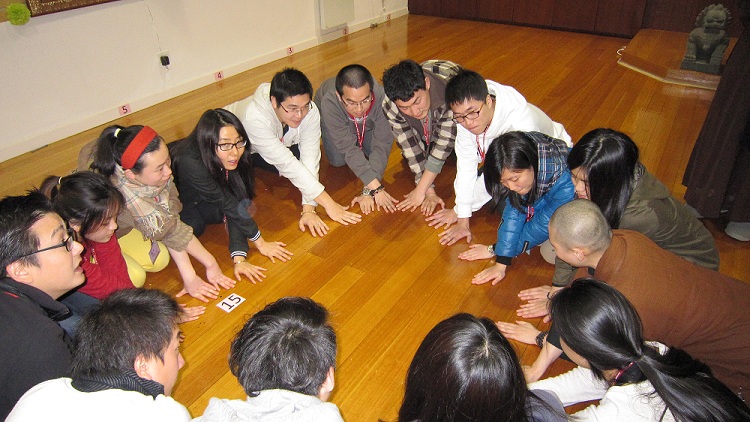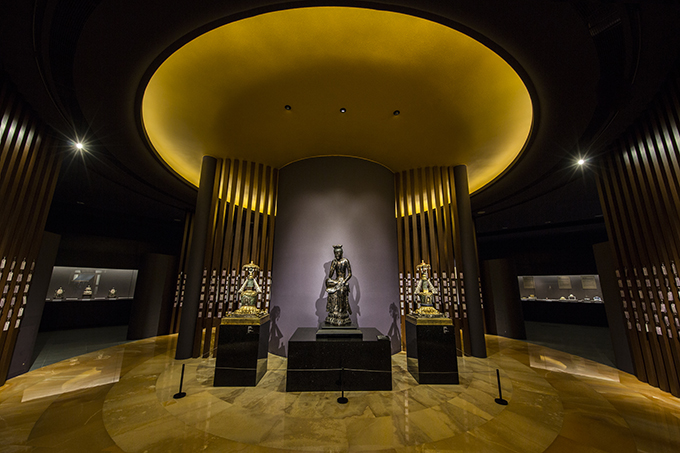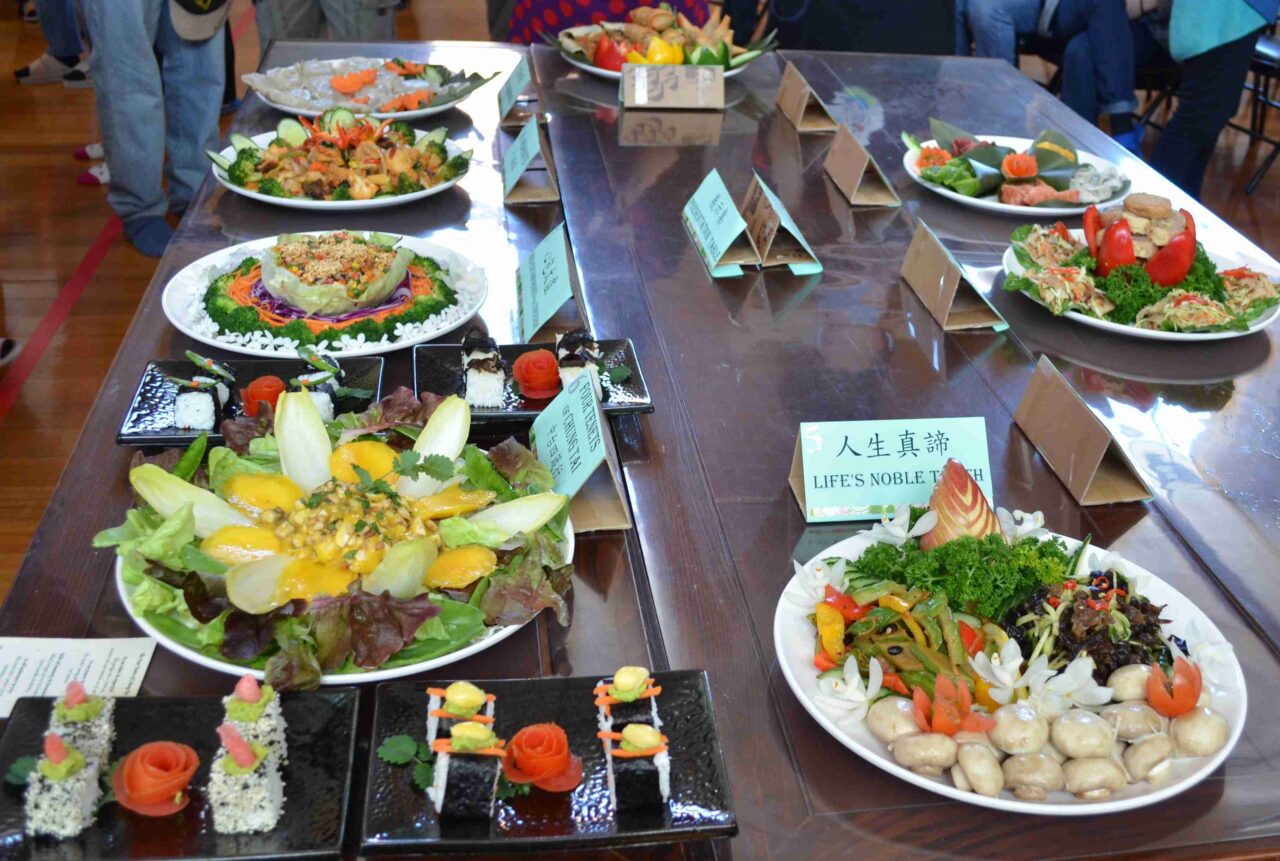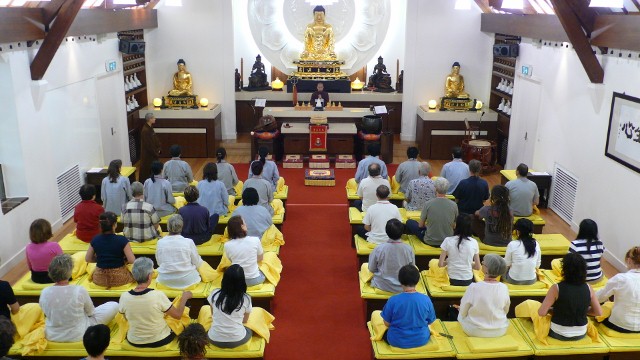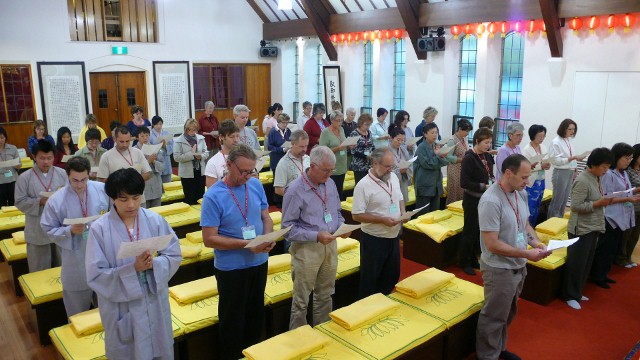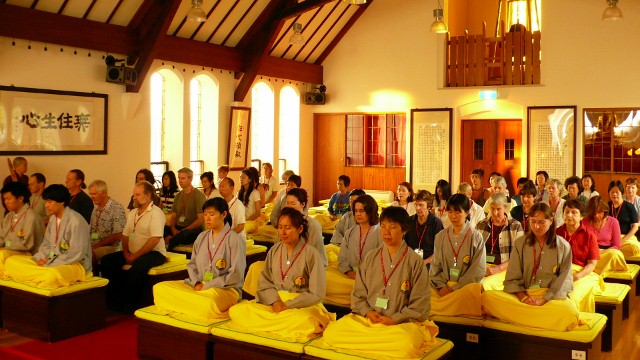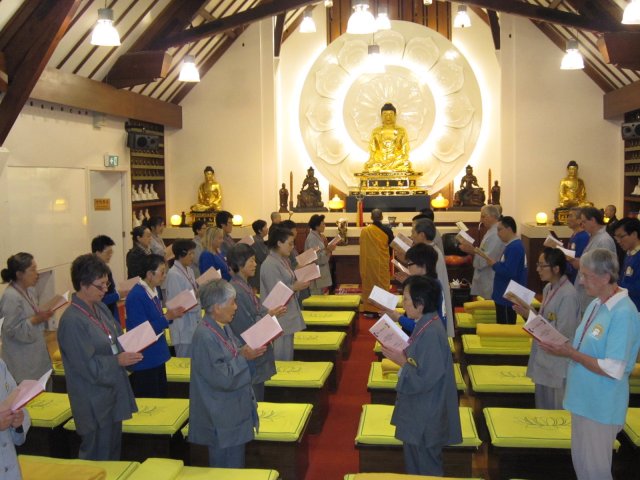Barry Newstead (Beginner’s Meditation class)
The 3-day retreat was my first experience with a multi-day retreat. In fact, it was my first experience of meditation beyond a half-day. Overall, I found it to be a challenge, but a good one in which I learned a lot and recognized how early I am in the process of understanding and disciplining my mind.
The retreat was an opportunity to focus internally and practice the discipline required to maintain a quiet, focused mind. While I struggle regularly to concentrate through a 30-40 minute sitting, I had started to feel like I could do a sitting and stay relatively focused without long periods of mind wandering, which is my main affliction when sitting. The weekly sitting at Bao Lin and the daily sitting at home has become more comfortable, though I still have a lot of improvement to make to tackle my very active “monkey mind”. The 3-day retreat was an opportunity to extend to a more sustained sitting to confront wandering thoughts over and over.
It was much more of an effort to stay in the present and focus on my breathing during many sittings of the retreat. There were times when my mind wandered or I focused too much on how long it would be until the bell rang. However, it was good to overcome these weaknesses as the retreat went on. I started to let thoughts of ‘when a session would end’ go from my mind. I found the less time I spent thinking about how long the session would last, the better the sitting was. The same was true with my wandering thoughts, though they were harder to let go. The good part of the retreat was that each hour presented an opportunity to practice and improve. Even though I still had a wandering mind, I managed to catch it more quickly and not waste a sitting on some random “conversation with myself”.
The physical part of the retreat was not too bad. My legs were OK most of the time, but my back and neck were very stiff. It was good to experience to learn to let the pain go. Later in the second day after a difficult couple of sessions where I felt rather uncomfortable, I started to get beyond the pain and not let it ruin my sitting. I realised that the pain was there, but it was fleeting. When I got up for walking meditation it quickly dissipated. On the third day, I started to do stretches during the breaks. This helped during the sitting and kept me very focused internally during the breaks.
The final aspect of the retreat that I found valuable was the simplicity of the day. It was really enjoyable to get up in the morning come to Bao Lin and then follow a very simple routine that wasn’t at all a distraction from the meditation. I liked how each session started on the hour and followed a standard process. I found the simple and tasty food, simple mats to rest on and the quietness of the whole monastery to be very peaceful and perfect for meditation. For me, it was a great change from “normal” life which is very hectic and where I constantly am making decisions and having to think about every step through the day.
In the month since the retreat, I have become more dedicated to my daily practice, but strangely my sittings have been challenging as I have a lot on my mind and in some ways the 20-30 minutes a day for meditation aren’t enough to quiet the mind in the way that one can do in a 3-day retreat. However, I still find the meditation valuable every day and feel healthier and more at peace after a sitting. I do look forward to Thursday night meditation classes and am excited to learn more and improve my practice at future retreats.
I’d like to thank the Venerable Master Abbess and all of the Shifus for their organisational efforts and silent, but steady support during the retreat. The Dharma talks were inspiring and important reminders of why I am on this journey and the constant presence of the Shifus helped to strengthen my commitment to the practice. I’d also like to thank my fellow practitioners. It was so inspiring to see so many people dedicated to their practice and I truly felt like a beginner among masters. Many thanks to everyone at Bao Lin. Amituofo.
Christine (English Intermediate class)
My mind did not want to attend the meditation retreat scheduled for the Queens’ Birthday weekend. In fact, in tried to get out of it.
“But it’s the Long Weekend,” it lamented.
“It’s the last public holiday for a while, are you seriously going to be anti-social and sit in retreat? Your friends probably think you’re so weird already.”
“Seriously, what do you think you’ll achieve by meditating for three days?”
So, my mind and I dragged ourselves like a rebellious child to the steps of Baolin at 8:45am on Saturday morning to sit in an extremely well organised three day silent meditation retreat run by the selfless Sangha (the Abbess, and ‘Shifus’ or ‘nuns’ at Baolin). The other meditators (or known as ‘cultivators’ or ‘practitioners’) were a mix of students from either the Chinese or English meditation classes.
A strict and coherent schedule of seated and walking meditation sessions, breaks, meal times and rest times was pinned to the board near the entrance, along with the rules of mindfulness and silence. Having taken part in a few three day and one day meditation retreats at Baolin before, I knew the drill, and I knew how helpful all the rules were in cultivating a mindfulness to get the most out of the three days. But as my mind knew well, it wouldn’t make it any easier.
What will I find out about myself this time round? I wondered as I avoided eye contact with the other meditators who were also preparing for three days of mindfulness. Despite having meditated (on-and-off) for a number of years I was still really quite anxious about it. When I first started doing these retreats it was the fear of the monotony and physical discomfort of sitting cross legged for so long. But now having a few more years under my belt, the anxiety wasn’t about the anticipation of physical pain.
Despite knowing and personally experiencing the profound benefits of meditation, it’s always difficult to explain my anxiety in committing to such a retreat. But this quote I once heard sums it up “A beautiful lotus flower blooms from the murkiest of mud.” I find another way to explain the phrase. It seemed to me that if our ever-present and non-abiding awareness is the beautiful lotus, then meditation is definitely the nutritious dirty mud, the unglamorous often emotionally and physically painful ground from which the blossoming and growth is made possible.
To break it down further, this is what I’ve noticed through the years of my journeying through meditation: Mostly, I think I’m a good person. You know, the usual – I try my best with most things, being a good friend, a good sister, a good daughter, a good worker. I even try and be a good Samaritan once in a while, helping out the beggar on the street if I have coins or food, never intentionally killing living things, helping out where I can… I think all of these things and then…. Meditation ALWAYS tells me otherwise.
I don’t mean to say that I end up feeling worse after meditation and that meditation or Buddhism tells me I’m a ‘bad person’. That’s not true. And I certainly don’t mean that meditation or Buddhism fosters guilt. It’s more that meditation often lifts and unveils layers and layers of beliefs you have about yourself and the world. I don’t know how or why this happens, but I do know that it comes with the heightened awareness and mindfulness and I think it is also sign that you are starting to see things as they really are. Yes, as they really are. When you act, speak and make intentions from a place of seeing things as they really are (rather than an emotional or mental projection), you begin to be able to act, speak and intend far more wisely. This in turn, makes life somehow, infinitely smoother, happier and with far less drama. This is from my experience anyway.
So, back to the story. I suppose my anxiety stemmed from somehow knowing deep down, after past experience on such retreats, that after the three days, I might find out more about myself, perhaps some things that would take me by surprise, and some things that would be a bit confronting, which might mean my old ways of thinking and doing things would be made virtually impossible. My ego did not like the sound of that one bit. My ego would prefer to be in the company of good friends, on a long weekend, soaking up the life that it had cleverly built for itself (preferably in the sun, with good music).
But here we were, at Baolin. Trapped, said my mind. The first day passed relatively quickly. My first retreats at Baolin a few years ago, where the burning sensation on my leg was so great within the first 30 minutes of sitting that I literally, I confess, wanted to get up, march out of the silent hall. At the time, I thought there was no way, in heaven or hell, I could ever get used to this ‘meditation thing’. It just wasn’t for me.
The pains you feel during meditation can often be unique, and are symptomatic of the particular type of karma you are to face. I believed this, because in those years, my temper and ferocious anger was certainly my big ticket item. So it made sense that meditation often felt like I was burning alive in a hot pot. To the beginner meditators I may be scaring with my words: it gets better, and remember, every meditator’s journey is unique. I’m so glad I persisted. Now I can manage to reach a point where sitting for 30-45 minutes at a time over 9 sessions no longer filled me with the usual back, leg, hip and everything-pain that beginner meditators are usually faced with.
On the second day, something shifted. My desire to escape grew and grew and I found every session extremely difficult. The monkey mind had grown into a huge and diseased ape and would not let up. All the techniques I had learned to date weren’t working and I was emotionally exhausted, frustrated, wanted to cry continuously and I had had enough, wished I could just leave on the Sunday after dinner, dive into bed, and never return. From my years of Buddhist practice, I was also aware that these overwhelming negative feelings could be yet another ‘karmic obstacle’ getting in the way of some much needed clarity that meditation would bring. I didn’t care. The ape of the mind had taken hold, and I wanted to leave.
Each day of the retreat, the Abbess would give various dharma talks during the meditation sessions. As an attendee of meditation classes for the last few years, my friend/ Dharma-sister Faith and I had the same experience that the delivery and timing of the Abbess’ talk on a particular night would somehow always strike a chord, exactly one we seemed to need to hear at that time. During the retreat, this was no different. The particular talk given this afternoon touched on the human condition with respect to greed and craving, the limitlessness of human desire, and came with an abundance of helpful analogies about people who, comparing themselves to other extreme circumstances, would feel that their desires were modest in comparison (and perhaps thus deserving to be fulfilled) but how this too led them to suffer. (It’s never all doom and gloom with such talks however. The talks always focus on helpful and practical insights to untie these bundles of suffering in our daily practice).
When listening to these talks in meditation, one has the rare opportunity to contemplate the wisdoms contained therein. It is through this contemplation (coupled with the Abbess’ eloquence and timing of these talks) that listening to the talks becomes less cerebral, and something shifts at an experiential level. My mind was still partly on leaving, and partly making sense of the talk I was hearing, and then something shifted again. I have heard such similar talks time and time again, sometimes I will recognise instantly that it is something I need to learn, but other times, when it is things that I feel I don’t relate to, such as human beings’ incessant pursuit of certain things, I tune out thinking it does not apply to me. But this time, with this particular topic, that moment hit. Ohhhh. This teaching, yes. This teaching does apply to me. And then it was a domino effect and I could see, with this awareness, the millions of ways my pursuits, my beliefs had led me to this wound up, dissatisfied ape mind.
Buddhist or non-Buddhist, I honestly challenge any person to listen to one of the Abbess’ talks, and not find an aspect that has some real world and instant truth or applicability to it, that applies to the listeners own life. This has been my experience (as a very cynical, analytical and originally very anti-religion or anti-Buddhist audience member!). This is testimony to the Abbess’ wisdom and eloquence, I think, but also the sheer practicality of Buddhist teachings.
As always, I got bit emotional with the realisation (here I should note, that if I were properly meditating, I wouldn’t have followed the emotional thoughts…) but the emotion, is a mixture of sadness at the folly, and huge gladness and compassion – I am not a mother, but this image comes to mind – which is like a mother seeing how her child, who hurts him or herself in the same way again and again, finally understands, and so naturally, it’s like mother (the non-judging awareness) weeps in a way, with gladness at the child’s little enlightenment. It’s just such relief. But there’s a compassionate heartfelt sadness, a moment where you realise most if not all people, may have experienced the same ignorance, and may be suffering in the same way and you hope against hope that they too will experience this relief soon.
Here, I can’t emphasise enough the difficulty of explaining how important I think meditation is (probably largely, because I haven’t even mastered meditation myself) – but the above example is one illustration. This is my take on it, but hearing practical and helpful Buddhist teachings and understanding them at a mental level, is like, as someone once explained to me, having never tasted honey, and someone telling you about honey: it’s sweet, it’s thick and is delicious! You can understand what they are saying. You hear what they are saying. But what is sweet? What is delicious? How far it is to hear and mentally understand the words, compared with actually experiencing the taste of honey itself. Nothing quite compares. When you’ve tasted the honey, your understanding is a whole new level, it’s personalised and it’s experienced. Only then, do you really know. Meditation, contemplation and the mindfulness, wisdom and insights it brings, can often be like the actual taste of honey, the understanding of the Buddhist teachings at an experiential level. (And let’s face it, you’re less likely to forget about it once you’ve experienced it, rather than just hear about it!)
After hearing the Dharma talk, the ape mind became a mere monkey, and the monkey had now become tamed, for a little while. For now. And I no longer wanted to leave. I stayed with renewed commitment to meditation and with ‘whatever arises’. Warts and all. I should also say now, that while I’m recounting this particular experience for this article, the trick is of course, to not think too much about them, just keep observing, staying mindful, and staying true to the practice. Bad or good, thoughts are just thoughts, and are passing illusions which we watch, while meditating.
I have tried to give a very honest account, albeit a little jumbled, on my experience with the meditation retreat. Sometimes I think that for a beginner meditator, or even a meditator who is grappling with the worst knee pain in the world, or a meditator who can’t stop thinking about the fight they had with their partner or their parent, or a meditator who just keeps falling asleep during practice, it can be really hard, to realise when looking around a Zen hall full of straight backed practitioners, that everyone is on their own (sometimes difficult, but worthwhile) journey. However, it is from my experience that life is infinitely more joyous, smoother, happier and so much more enriched and fulfilling now that I’ve had meditation as part of my life. It’s not because things on the outside have changed – or maybe they have – but it’s because meditation changes you, and always for the better.
To the Abbess, Shifus and the Baolin volunteers, I say a heartfelt thank you for providing us an opportunity to practice on the Retreat. To my fellow meditators, or those of you considering signing up for classes to start meditation, I say definitely give it a go, and always, always, always, keep practicing.

